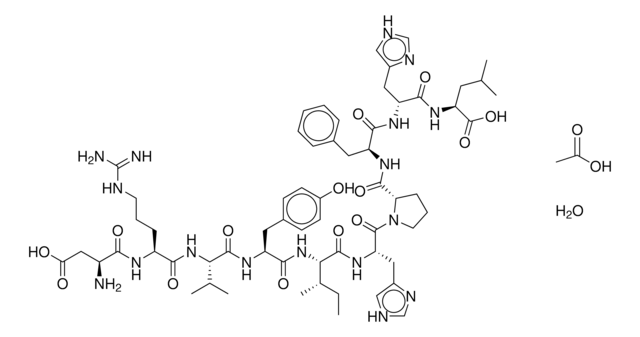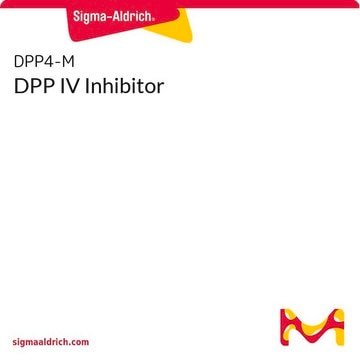S6135
Somatostatin 28
≥97% (HPLC)
Synonym(s):
Prosomatostatin
About This Item
Recommended Products
Quality Level
Assay
≥97% (HPLC)
form
powder
mol wt
3148.56
storage condition
(Keep container tightly closed in a dry and well-ventilated place)
concentration
>70% (peptide content)
technique(s)
activity assay: suitable
solubility
water: 1 mg/mL, clear, colorless
UniProt accession no.
storage temp.
−20°C
SMILES string
CSCCC(NC(=O)C(C)NC(=O)C1CCCN1C(=O)C(CC(N)=O)NC(=O)C(CO)NC(=O)C(CC(N)=O)NC(=O)C(C)NC(=O)C(N)CO)C(=O)NC(C)C(=O)N2CCCC2C(=O)NC(CCCNC(N)=N)C(=O)NC(CCC(O)=O)C(=O)NC(CCCNC(N)=N)C(=O)NC(CCCCN)C(=O)NC(C)C(=O)NCC(=O)NC3CSSCC(NC(=O)C(CO)NC(=O)C(NC(=O)C(Cc4ccccc4)NC(=O)C(NC(=O)C(CCCCN)NC(=O)C(Cc5c[nH]c6ccccc56)NC(=O)C(Cc7ccccc7)NC(=O)C(Cc8ccccc8)NC(=O)C(CC(N)=O)NC(=O)C(CCCCN)NC3=O)C(C)O)C(C)O)C(O)=O
InChI
1S/C137H207N41O39S3/c1-69(154-113(194)82(37-19-22-47-138)159-115(196)85(40-25-50-149-136(145)146)160-118(199)87(44-45-106(188)189)163-116(197)86(41-26-51-150-137(147)148)164-130(211)101-43-27-52-177(101)133(214)72(4)156-114(195)88(46-54-218-7)158-110(191)71(3)155-129(210)100-42-28-53-178(100)134(215)95(61-104(144)186)171-126(207)96(65-180)172-124(205)93(59-102(142)184)165-111(192)70(2)153-112(193)80(141)64-179)109(190)152-63-105(187)157-98-67-219-220-68-99(135(216)217)174-127(208)97(66-181)173-132(213)108(74(6)183)176-125(206)91(57-77-33-15-10-16-34-77)170-131(212)107(73(5)182)175-119(200)84(39-21-24-49-140)161-122(203)92(58-78-62-151-81-36-18-17-35-79(78)81)168-121(202)90(56-76-31-13-9-14-32-76)166-120(201)89(55-75-29-11-8-12-30-75)167-123(204)94(60-103(143)185)169-117(198)83(162-128(98)209)38-20-23-48-139/h8-18,29-36,62,69-74,80,82-101,107-108,151,179-183H,19-28,37-61,63-68,138-141H2,1-7H3,(H2,142,184)(H2,143,185)(H2,144,186)(H,152,190)(H,153,193)(H,154,194)(H,155,210)(H,156,195)(H,157,187)(H,158,191)(H,159,196)(H,160,199)(H,161,203)(H,162,209)(H,163,197)(H,164,211)(H,165,192)(H,166,201)(H,167,204)(H,168,202)(H,169,198)(H,170,212)(H,171,207)(H,172,205)(H,173,213)(H,174,208)(H,175,200)(H,176,206)(H,188,189)(H,216,217)(H4,145,146,149)(H4,147,148,150)
InChI key
GGYTXJNZMFRSLX-UHFFFAOYSA-N
Gene Information
human ... SST(6750)
Amino Acid Sequence
General description
The SST gene is mapped to human chromosome 3q27.3. Both SST-14 and SST-28 are cyclic peptide.
Application
- to study the effects of somatostatin in regulating hepatic growth hormone sensitivity
- to study its effects on insulin-like growth factor-I receptor expression in the gills of Oncorhynchus mykiss (a teleost fish)
- to assess the effects of somatostatinon GH (growth hormone)-stimulated IGF-I (insulin-like growth factor-I) expression
Biochem/physiol Actions
antibody
related product
Storage Class Code
11 - Combustible Solids
WGK
WGK 3
Flash Point(F)
Not applicable
Flash Point(C)
Not applicable
Personal Protective Equipment
Choose from one of the most recent versions:
Certificates of Analysis (COA)
Don't see the Right Version?
If you require a particular version, you can look up a specific certificate by the Lot or Batch number.
Already Own This Product?
Find documentation for the products that you have recently purchased in the Document Library.
Our team of scientists has experience in all areas of research including Life Science, Material Science, Chemical Synthesis, Chromatography, Analytical and many others.
Contact Technical Service






